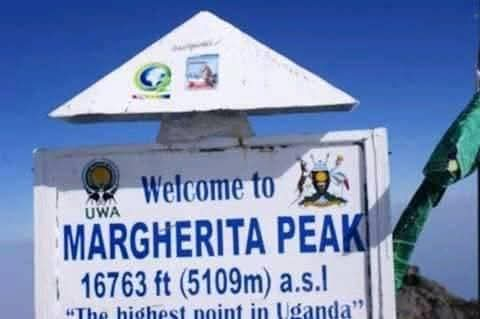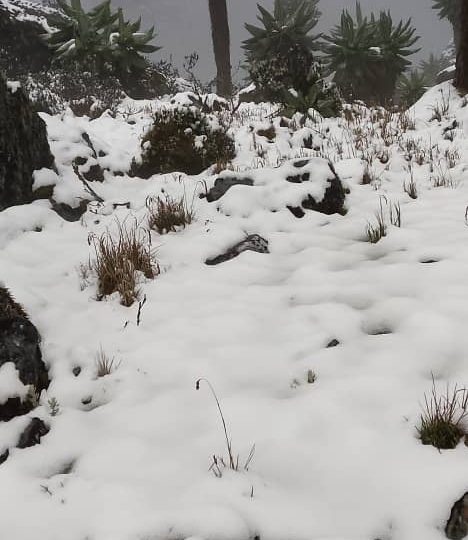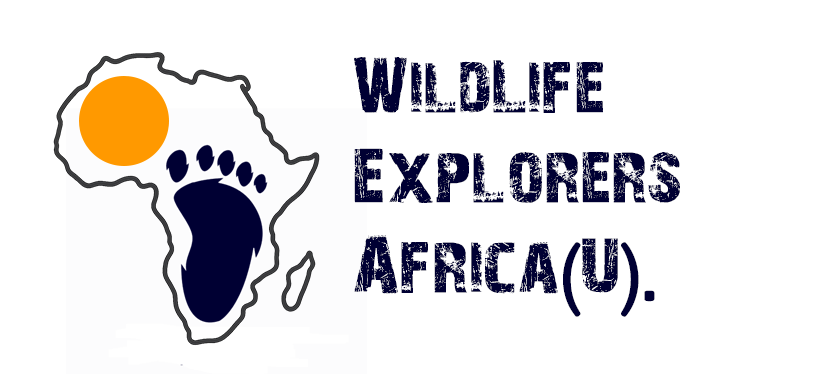7-Day Rwenzori Mountains Trekking-breathtaking trek

Day 1: Nyakalengija (1650m) to Nyabitaba Camp (2650m)
Distance: 7 km | Time: 5–6 hours | Elevation Gain: 1200m
Begin at the Rwenzori Mountaineering Services office for gear, guides, porters, and chef. Trail passes through local homesteads, elephant grass, and dense forest. Cross River Mahoma and ascend steeply to Nyabitaba.
Wildlife encounter includes white & black colobus monkeys, three-horned chameleon, Rwenzori Turaco.
Overnight: Nyabitaba Camp
Day 2: Nyabitaba Camp (2650m) to John Matte Camp (3505m)
Distance–11 km| Time: 6–7 hours Elevation Gain: 855m
Begin the day by descending to the right from Nyabitaba Camp, following a forested trail for about 30 minutes to the Kurt Shafer Bridge, located just before the confluence of the Mubuku and Bujuku Rivers.
From here, the trail eases for a couple of hours through a serene bamboo forest, offering a gentle rhythm before the terrain shifts dramatically. You’ll enter a challenging stretch of slippery, moss-covered rocks, requiring careful footing—almost like spelunking through a natural maze.
At Nyamileju Rock Shelter, pause to admire breathtaking views of Mount Stanley and Mount Speke, framed by mist and alpine vegetation. The trail then ascends into the giant heather zone, where surreal landscapes of lobelia and groundsel dominate.
The final approach to John Matte Camp involves crossing a tiring bog, but the reward is immense: panoramic views of Mount Stanley and the shimmering Margherita Glacier.
Highlights:
- Cross the iconic Kurt Shafer Bridge
- Traverse bamboo forests and mossy rock corridors
- Spot alpine flora: giant heather, lobelia, groundsel
- Scenic views of Mount Stanley and Speke
- High chance of seeing Margherita Glacier from camp
Enjoy dinner and rest at John Matte Camp, nestled in the alpine zone with crisp mountain air and dramatic scenery.
Day 3: John Matte Camp (3505m) to Bujuku Camp (3900m)
Distance-5 km| Time: 4–5 hours| Elevation Gain-395m
Departing from John Matte Camp, the trail descends to cross the Bujuku River, entering the mystical Lower Bigo Bog—a surreal wetland dominated by giant lobelias. Trekking here is an adventure in itself, as you leap from tussock to tussock, often sampling the icy ooze beneath your boots.
After conquering the lower bog, the trail continues into the Upper Bigo Bog, following the meandering Bujuku River, which occasionally disappears underground, fed by Lake Bujuku. The landscape opens up to dramatic views of Mount Baker to the south and Mount Stanley to the west.
Nestled in a narrow glacial valley beneath Stuhlmann Pass, Bujuku Camp sits in the shadow of Mount Baker and Mount Speke, offering a remote and atmospheric resting place.
Highlights:
- Cross the Bujuku River and explore the legendary Bigo bogs
- Encounter giant lobelias and alpine wetlands
- Views of Mount Baker and Mount Stanley
- Follow the underground-fed Bujuku River
- Camp beneath towering peaks in a glacial valley
Enjoy dinner and a peaceful night at Bujuku Camp, surrounded by misty peaks and the haunting silence of the high Rwenzori.
Day 4: Bujuku Camp (3900m) to Elena Hut (4541m)
Distance-4 km| Time: 3–4 hours| Elevation Gain-641m
Depart Bujuku Camp and brace for more boggy terrain as the trail climbs steeply along the western slopes of Lake Bujuku. You’ll ascend through the enchanting Groundsel Gully, a surreal corridor of towering giant groundsel and mist-laced rock faces.
At Scott-Elliot Pass (4372m), the highest point on the circuit before the summit, a metal ladder helps you navigate a steep rock section. Here, the trail splits:
- Right fork: Leads to Elena Hut and the base of Mount Stanley, ascending over massive boulders and exposed alpine terrain. This is the route for climbers aiming for Margherita Peak.
- Left fork: Descends toward Kitandara Lakes, offering a gentler path for trekkers not attempting the summit.
Those heading for the peak will spend the night at the icy and windswept Elena Hut, perched dramatically on the edge of the Stanley Plateau.
Highlights:
- Ascend through the magical Groundsel Gully
- Reach Scott-Elliot Pass—the gateway to Mount Stanley
- Navigate steep boulder trails and metal ladders
- Choose between summit route or descent to Kitandara
- Experience the raw alpine beauty of Elena Hut
Dinner and overnight at Elena Hut, a rugged base camp for summit climbers, surrounded by glaciers and high-altitude silence.
Day 5: Elena Hut (4541m) → Margherita Peak (5109m) → Kitandara Lakes Camp (4022m)
Distance-10 km round trip, Time: 8–10 hours, Elevation Gain-568m to summit, then descent of ~1087m, Difficulty: Very strenuous and technical
Summit Ascent:
For climbers aiming to conquer Margherita Peak, the day begins early with a push toward the Stanley Glacier. The ascent takes 5–7 hours, depending on weather and pace, and demands high physical fitness and technical skill.
The route traverses three glaciers, slippery rock faces, and exposed alpine ridges. Climbers must be acclimatized to fog, altitude sickness, and icy conditions. Using ropes and crampons, you’ll cross the Stanley Plateau, then scramble up to the summit of Margherita Peak—the highest point in the Rwenzori Mountains and third-highest in Africa.
Even if you don’t reach the summit due to weather or fatigue, the journey itself is a triumph.
Descent to Kitandara:
After the summit attempt, descend through Scott-Elliot Pass, where dramatic views unfold: Lake Bujuku, Mount Speke, Mount Stanley, and the shimmering Kitandara Lakes below.
The trail winds through the alpine zone, marked by sparse vegetation and rugged boulders. Finally, descend past the twin Kitandara Lakes to reach the tranquil Kitandara Lakes Camp, nestled beside the water.
Highlights:
- Technical glaciers climb to Margherita Peak
- Cross Stanley Plateau and icy ridges
- Panoramic views from Scott-Elliot Pass
- Alpine descent to Kitandara Lakes
- Rewarding rest beside the lakes
Dinner and overnight at Kitandara Lakes Camp, surrounded by misty waters and towering peaks—a serene contrast to the day’s intensity.

Day 6: Kitandara Lakes Camp (4022m) to Guy Yeoman Camp (3505m)
Distance-9 km| Time: 5–6 hours| Elevation Change- Ascent to 4280m, then descent to 3505m
Trail Overview:
Depart Kitandara Lakes Camp by ascending steeply up the headwall, a dramatic slope that rises from the base of Mount Baker. The trail hugs the southern flank of the mountain, leading to the high-altitude Freshfield Pass at 4280m.
From this vantage point, trekkers are rewarded with sweeping views into the Congo Basin to the west and the towering presence of Mount Stanley to the north—a moment of pure alpine majesty.
The descent from the pass follows a long, winding trail that passes the Bujongolo Rock Shelter, a historic site that once served as the base camp for the Duke of Abruzzi’s 1906 expedition, one of the earliest and most legendary climbs in Rwenzori history.
The trail continues through rugged terrain, descending into the heather and moss zone, eventually reaching the serene Guy Yeoman Camp, nestled beside rivers and surrounded by cliffs and lush vegetation.
Highlights:
- Steep ascent to Freshfield Pass with panoramic views
- Glimpse into the Congo and across to Mount Stanley
- Visit Bujongolo Rock Shelter—site of the 1906 Abruzzi expedition
- Descend through alpine and heather zones
- Camp beside rivers and cliffs at Guy Yeoman
Dinner and overnight at Guyeoman Camp, a peaceful retreat after a day of high-altitude history and breathtaking scenery.
Day 7: Guy Yeoman Camp (3505m) → Nyabitaba Camp (2560m) → Nyakalengija (1650m)
Distance-15 km| Time: 6–7 hours to Nyabitaba; 8–10 hours to Nyakalengija
Elevation Loss-1855m total
Trail Overview:
Begin your descent from Guyeoman Camp, navigating the steep and rugged Kichuchu cliffs, a dramatic drop that demands caution and steady footing. The trail winds through dense bamboo forest zones, echoing with birdsong and the rustle of mountain breezes.
After several hours, you will arrive at Nyabitaba Camp, where trekkers can choose to pause for lunch and rest, or continue the descent to Nyakalengija for a well-earned hot shower and celebration.
The full descent is long but rewarding, passing through varied vegetation zones—from alpine moss to montane forest—offering a final immersion in the Rwenzori’s ecological richness.
Highlights:
- Descend the dramatic Kichuchu cliffs
- Trek through lush bamboo forests
- Optional overnight at Nyabitaba or full descent to Nyakalengija
- Return to civilization with hot showers and warm meals
🛖 Overnight:
- Option 1: Dinner and overnight at Nyabitaba Camp
- Option 2: Continue to Nyakalengija for a celebratory end to the trek
Congratulations! You’ve completed one of Africa’s most challenging and rewarding mountain treks—through bogs, glaciers, alpine passes, and cultural memory.

